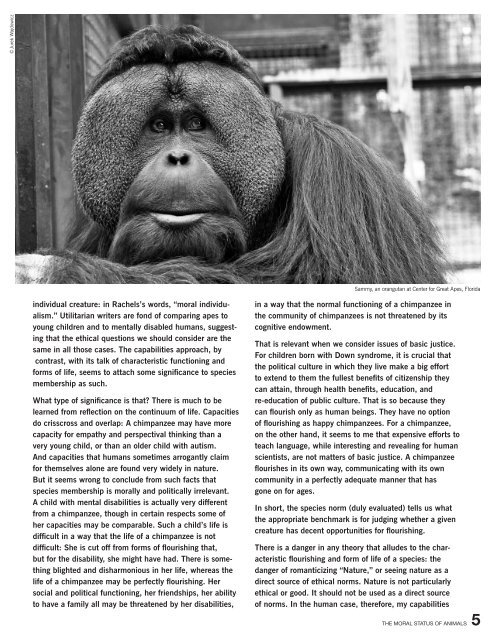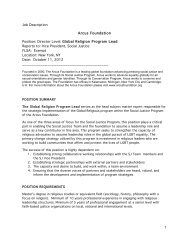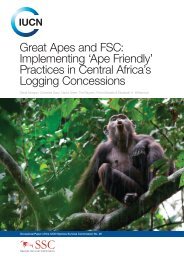© Jurek WajdowiczSammy, an orangutan at Center for Great Apes, Floridaindividual creature: in Rachels’s words, “moral individualism.”Utilitarian writers are fond of comparing apes toyoung children and to mentally disabled humans, suggestingthat <strong>the</strong> ethical questions we should consider are <strong>the</strong>same in all those cases. The capabilities approach, bycontrast, with its talk of characteristic functioning andforms of life, seems to attach some significance to speciesmembership as such.What type of significance is that? There is much to belearned from reflection on <strong>the</strong> continuum of life. Capacitiesdo crisscross and overlap: A chimpanzee may have morecapacity for empathy and perspectival thinking than avery young child, or than an older child with autism.And capacities that humans sometimes arrogantly claimfor <strong>the</strong>mselves alone are found very widely in nature.But it seems wrong to conclude from such facts thatspecies membership is morally and politically irrelevant.A child with mental disabilities is actually very differentfrom a chimpanzee, though in certain respects some ofher capacities may be comparable. Such a child’s life isdifficult in a way that <strong>the</strong> life of a chimpanzee is notdifficult: She is cut off from forms of flourishing that,but for <strong>the</strong> disability, she might have had. There is somethingblighted and disharmonious in her life, whereas <strong>the</strong>life of a chimpanzee may be perfectly flourishing. Hersocial and political functioning, her friendships, her abilityto have a family all may be threatened by her disabilities,in a way that <strong>the</strong> normal functioning of a chimpanzee in<strong>the</strong> community of chimpanzees is not threatened by itscognitive endowment.That is relevant when we consider issues of basic justice.For children born with Down syndrome, it is crucial that<strong>the</strong> political culture in which <strong>the</strong>y live make a big effortto extend to <strong>the</strong>m <strong>the</strong> fullest benefits of citizenship <strong>the</strong>ycan attain, through health benefits, education, andre-education of public culture. That is so because <strong>the</strong>ycan flourish only as human beings. They have no optionof flourishing as happy chimpanzees. For a chimpanzee,on <strong>the</strong> o<strong>the</strong>r hand, it seems to me that expensive efforts toteach language, while interesting and revealing for humanscientists, are not matters of basic justice. A chimpanzeeflourishes in its own way, communicating with its owncommunity in a perfectly adequate manner that hasgone on for ages.In short, <strong>the</strong> species norm (duly evaluated) tells us what<strong>the</strong> appropriate benchmark is for judging whe<strong>the</strong>r a givencreature has decent opportunities for flourishing.There is a danger in any <strong>the</strong>ory that alludes to <strong>the</strong> characteristicflourishing and form of life of a species: <strong>the</strong>danger of romanticizing “Nature,” or seeing nature as adirect source of ethical norms. Nature is not particularlyethical or good. It should not be used as a direct sourceof norms. In <strong>the</strong> human case, <strong>the</strong>refore, my capabilitiesTHE MORAL STATUS OF ANIMALS5
view does not attempt to extract norms directly from somefacts about human nature. We must begin by evaluating<strong>the</strong> innate powers of human beings, asking which onesare central to <strong>the</strong> notion of a life with dignity. Thus notonly evaluation but also ethical evaluation is put into <strong>the</strong>approach from <strong>the</strong> start. Many things that are found inhuman life, like <strong>the</strong> capacities for cruelty, despair, orself-destruction, are not on <strong>the</strong> capabilities list.In <strong>the</strong> case of nonhuman animals, however, we need toremember that we are relatively ignorant of what a goodlife for each sort of animal is and strongly biased in favorof our own power interests. Thus our attempts to evaluate<strong>the</strong> capacities of animals, saying that some are good ando<strong>the</strong>rs not so good, may easily go wrong. Moreover, whilewe can expect a potentially violent human (as all humansare) to learn to restrain her or his capacity for violence,we cannot expect so much learning and control frommany animal species. Thus to deny a tiger <strong>the</strong> exerciseof its predatory capacities may inflict significant suffering,whereas we require a human to learn to live at peace witho<strong>the</strong>rs (or we should!).Here <strong>the</strong> capabilities view may, however, distinguish twoaspects of <strong>the</strong> capability in question. A tiger’s capability tokill small animals, defined as such, does not have intrinsicethical value, and political principles can omit it (and eveninhibit it in some cases). But a tiger’s capability to exerciseits predatory nature so as to avoid <strong>the</strong> pain of frustrationmay well have value, if <strong>the</strong> pain of frustration is considerable.Zoos have learned how to make that distinction.Noticing that <strong>the</strong>y were giving predatory animals insufficientexercise for <strong>the</strong>ir predatory capacities, <strong>the</strong>y have hadto face <strong>the</strong> question of <strong>the</strong> harm done to smaller animalsby allowing such capabilities to be exercised. Should <strong>the</strong>ygive a tiger a tender gazelle to crunch on? The Bronx Zoohas found that it can give <strong>the</strong> tiger a large ball on a rope,whose resistance and weight symbolize <strong>the</strong> gazelle. Thetiger seems satisfied. Wherever predatory animals areliving under direct human support and control, suchsolutions seem <strong>the</strong> most ethically sound.Much more remains to be done to ground this approachphilosophically and to articulate its results, which I tryto do in Frontiers. What, however, should <strong>the</strong> practicalupshot be?In general <strong>the</strong> capabilities approach suggests that it isappropriate for each nation to include in its constitutionor o<strong>the</strong>r founding statement of principle a commitmentto regarding nonhuman animals as subjects of politicaljustice and to treating <strong>the</strong>m in accordance with <strong>the</strong>irdignity. The constitution might also spell out some of<strong>the</strong> very general principles suggested by <strong>the</strong> capabilitiesapproach, and judicial interpretation can make <strong>the</strong> ideasmore concrete. The High Court of Kerala made a goodbeginning, thinking about what <strong>the</strong> idea of “life withdignity” implies for <strong>the</strong> circus animals in <strong>the</strong> case.The rest of <strong>the</strong> work of protecting animal entitlementsmight be done by suitable legislation and by court casesdemanding <strong>the</strong> enforcement of laws, where <strong>the</strong>y are notenforced. At <strong>the</strong> same time, many of <strong>the</strong> issues coveredby this approach cannot be dealt with by nations takenin isolation, but can be treated only through internationalcooperation. So we also need international accordscommitting <strong>the</strong> world community to <strong>the</strong> protection ofanimal habitats and <strong>the</strong> eradication of cruel practices.It has been obvious for a long time that <strong>the</strong> pursuit ofglobal justice requires <strong>the</strong> inclusion of many people andgroups not previously included as fully equal subjects ofjustice: <strong>the</strong> poor; members of religious, ethnic, and racialminorities; and more recently women, <strong>the</strong> disabled, andinhabitants of poor nations distant from one’s own. But atruly global justice requires not simply looking across <strong>the</strong>world for fellow species members who are entitled to adecent life.It also requires looking around <strong>the</strong> world at <strong>the</strong> o<strong>the</strong>rsentient beings with whose lives our own are inextricablyand complexly intertwined. Kant’s approach does notconfront <strong>the</strong>se questions as questions of justice. Probablya strict Kantian could not so confront <strong>the</strong>m, not withoutconsiderably modifying Kant’s own view about rationalityas <strong>the</strong> basis of moral respect. Utilitarian approaches boldlyconfront <strong>the</strong> wrongs animals suffer, and <strong>the</strong>y deserve highpraise. But in <strong>the</strong> end, I have argued, Utilitarianism is toohomogenizing — both across lives and with respect to <strong>the</strong>heterogeneous constituents of each life — to provide uswith a fully adequate <strong>the</strong>ory of animal justice. The capabilitiesapproach, which begins from an ethically attunedconcern for each form of animal life, offers a model thatdoes justice to <strong>the</strong> complexity of animal lives and <strong>the</strong>irstrivings for flourishing. Such a model seems an importantpart of a fully global <strong>the</strong>ory of justice.Copyright 2006 The Chronicle of Higher EducationMartha C. Nussbaum is a professor in <strong>the</strong> philosophy department, lawschool, divinity school, and <strong>the</strong> college at <strong>the</strong> University of Chicago. Herbook Frontiers of Justice: Disability, Nationality, Species Membershipwas published by Harvard University Press. Martha Nussbaum receivedher B.A. from NYU and her M.A. and Ph.D. from Harvard. She has taughtat Harvard, Brown, and Oxford Universities.THE MORAL STATUS OF ANIMALS6






